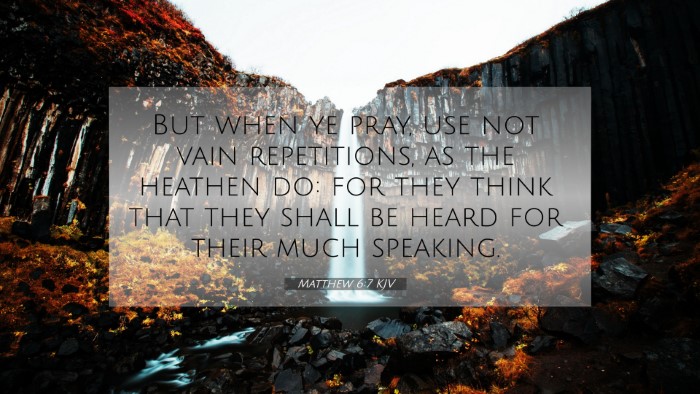Understanding Matthew 6:7
Bible Verse: Matthew 6:7
"But when you pray, use not vain repetitions, as the heathen do: for they think that they shall be heard for their much speaking."
Meaning of the Verse
This verse addresses the manner in which we approach prayer. It emphasizes sincerity and purposefulness rather than empty, repetitive phrases often used by the heathen in their worship rituals. Jesus teaches that God values heartfelt dialogue over verbosity.
Insights from Public Domain Commentaries
Matthew Henry's Commentary
Matthew Henry emphasizes the importance of the heart in prayer. He explains that prayer is not about the accumulation of words or mere ritualistic behavior, but rather about genuine communication with God. Henry critiques those who pray for the sake of being seen or heard by others, highlighting that true prayer does not require grand speeches or elaborate expressions.
Albert Barnes' Notes
Albert Barnes notes that the phrase "vain repetitions" refers to the mechanical, inauthentic prayers of the Gentiles. He conveys that believers should not imitate this practice but instead should offer sincere and thoughtful prayers. Barnes advises that effective prayer is grounded in faith and trust in God, rejecting the notion that quantity of words leads to better results.
Adam Clarke's Commentary
Adam Clarke expands on the idea that prayer should be meaningful. He suggests that the repetition found in some prayers may stem from a lack of understanding of God’s will and nature. Clarke encourages believers to approach prayer with awareness and intentionality, stressing that God hears the prayers of the sincere, regardless of their length.
Cross-References
This verse connects with several other scriptures, revealing deeper insights into the nature of prayer:
- 1 Thessalonians 5:17: “Pray without ceasing.” - Emphasizing the importance of consistent, heartfelt communication with God.
- James 1:6: “But let him ask in faith, nothing wavering.” - Relates to the concept of sincere prayer free from doubt.
- Matthew 6:5: “And when you pray, you shall not be like the hypocrites.” - Similar warning against insincere prayer.
- Luke 11:1-4: The Lord's Prayer - Illustrates a model for sincere communication with God.
- Romans 8:26: “The Spirit also helps in our weaknesses.” - Highlights the role of the Holy Spirit in our prayers.
- Proverbs 15:29: “The Lord is far from the wicked, but He hears the prayer of the righteous.” - Reassures that sincere prayer from the righteous is heard by God.
- Philippians 4:6: “Be anxious for nothing, but in everything by prayer and supplication.” - Encourages bringing all concerns to God with genuine intent.
Thematic Connections and Insights
This verse, and its related scriptures, collectively contribute to a deeper understanding of prayer within the Christian faith. The thematic connections include:
- Sincerity in Prayer: The necessity for genuine intention in dialogue with God.
- Faith in Communication: Trusting that God hears and responds to our heartfelt prayers.
- The Role of the Holy Spirit: Assisting believers in their prayer life, facilitating a deeper connection with God.
Practical Application
In light of Matthew 6:7, believers are encouraged to cultivate a prayer life characterized by:
- Authenticity: Approach God with a sincere heart and genuine concerns.
- Faithfulness: Maintain regular communication with God, ensuring that prayers reflect a personal relationship.
- Mindfulness: Be aware of the words we use, focusing on meaningful dialogue rather than ritualistic redundancy.
Conclusion
Understanding Matthew 6:7 invites believers to refine their approach to prayer, emphasizing that the quality of their communication with God is paramount. Combined insights from various commentaries underline the importance of heartfelt prayer that reflects an authentic relationship with the Creator. Cross-referencing related scriptures enriches this understanding, providing further guidance on how prayer should be rooted in sincerity, faith, and intentional connection with God.













